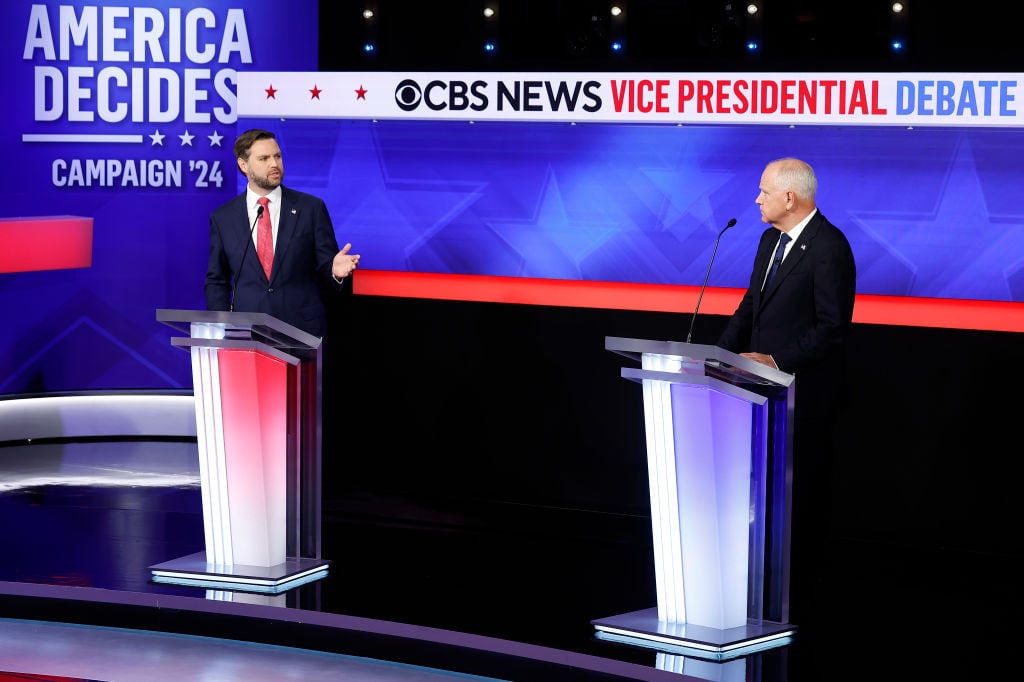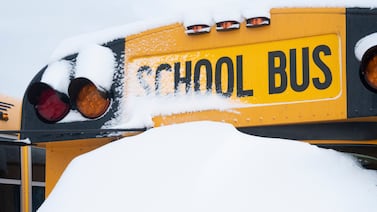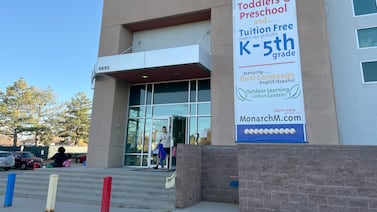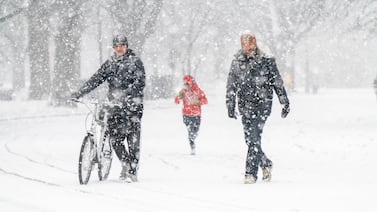Sign up for Chalkbeat’s free weekly newsletter to keep up with how education is changing across the U.S.
To make schools safer, should America invest more in school security measures and police officers? Or do more to limit access to guns?
Minnesota Gov. Tim Walz and U.S. Sen. J.D. Vance of Ohio agreed at Tuesday’s vice presidential debate that gun violence is a scourge on American youth. But they laid out different visions of how to address the problem.
Vance, the Republican running mate of former President Donald Trump, echoed comments he made in the wake of a recent school shooting in Georgia that cast school resource officers and so-called school hardening as the most realistic solution to gun violence. Walz, the Democratic vice presidential candidate, said that red flag laws and better background checks could help keep guns out of the hands of people who would use them to do harm.
Both invoked their perspectives as fathers who send their children into the world each day and hope they return. Walz said that his 17-year-old son recently witnessed a shooting at a community center.
The exchange came during a wide-ranging and largely polite debate that focused heavily on immigration and the economy and included big promises about child care. The nearly two-hour debate was hosted by CBS and moderated by CBS Evening News anchor Norah O’Donnell and Margaret Brennan, a Face the Nation moderator.
This could be the last debate before the election. When Vice President Kamala Harris and Trump debated on Sept. 10, there was a brief mention of the child tax credit but no discussion of K-12 education. Harris has said she would debate Trump again, but so far Trump has not agreed.
Vance favors more school security, Walz does not
The exchange about gun violence opened with a question to Vance about whether he agreed with the idea of charging parents when their children commit acts of violence, as happened after shootings in Oxford, Michigan, and Apalachee, Georgia. Studies find that most school shooters obtain their guns at home.
Vance said he would defer to local law enforcement on those decisions. Then — as he did throughout the debate — he linked the problem to immigration, in this case by talking about cartels trafficking in guns. He reiterated his belief that keeping guns out of the hands of “bad guys” is not realistic but that schools can be made safer.
“I don’t want my kids to go to school in a school that feels unsafe or where there are visible signs of security,” Vance said. “But I, unfortunately, think that we have to increase security in our schools. We have to make the doors lock better, we have to make the doors stronger. We’ve got to make the windows stronger. And, of course, we’ve got to increase school resource officers,” referring to police in schools.
Walz countered that he had visited schools in Finland and not seen those same kinds of hardening measures, despite high rates of gun ownership. Finland tightened gun regulations in the wake of two school shootings in 2007 and 2008, including requiring a license and gun registration.
“Do you want your schools hardened to look like a fort?” Walz said. “When we know there’s countries around the world that their children aren’t practicing these types of drills. They’re being kids. … You can still keep your firearms and we can make a difference.”
In the wake of high-profile school shootings, U.S. schools have already added many of the “hardening” measures that Vance called for.
Nearly all public schools control access to their doors when kids are in the building with measures like locks and monitoring. Many now use a single point of entry. Around 60% of public schools also control access to their grounds when school is in session with barriers like a locked gate.
And while some school districts have reduced the presence of police on school campuses in recent years, others have brought back school police or added more security. Around 45% of public schools had an armed police officer or other sworn law enforcement officer present at least once a week during the 2021-22 school year, the most recent federal data shows.
Most schools plan for the possibility of an active shooter and conduct lockdown drills, though there’s debate over the right way to do that so that kids aren’t traumatized by the drills.
Last year, an NPR/Ipsos poll found that 88% of K-12 parents supported teaching kids basic lockdown procedures, and 63% agreed that kids should be required to do at least one drill a year starting in kindergarten. There was much less support for using realistic measures like banging on classroom doors or playing the sound of gunshots.
Despite their terrifying frequency and randomness, mass shootings at schools represent a very small share of gun deaths. Vance said law enforcement needs to be empowered to address gun violence in cities, and the country needs to do more to get to the root causes of mental health problems that he said many gun deaths stem from.
Walz noted that many gun deaths, especially in rural areas, are suicides and that children die by suicide when they obtain access to their parents’ guns. Around a third of deaths by gunfire among children and teens in 2021 were suicides, federal data shows. Walz said he would not want to stigmatize people with mental health problems as being more likely to commit violence.
“We start looking for a scapegoat — sometimes it just is the guns,” Walz said.
Walz is a gun owner and describes himself as a supporter of the Second Amendment. As governor, Walz has enacted enhanced background checks and red-flag laws that allow authorities to remove firearms from someone found by a judge to be a threat to themselves or others.
VP candidates discuss paid leave, strengthening child care
The high cost and limited availability of child care is widely viewed as reaching crisis levels, with parents and especially mothers forgoing job opportunities because they can’t find safe people to care for their children.
Meanwhile, child care workers often earn poverty wages, and child care providers aren’t offering as many seats as they could because they can’t find workers. The United States is also the only developed nation to not have a national paid leave policy.
As governor, Walz signed a bill that will provide 12 weeks of paid family leave and 12 weeks of paid medical leave, with the cost covered by a payroll tax, starting in 2026.
Asked how long employers should have to pay for employees to stay home after the birth of a child, Walz didn’t provide a direct answer but said that paid leave policies are good for families and can co-exist with pro-business policies. He also said child care workers need to be paid better.
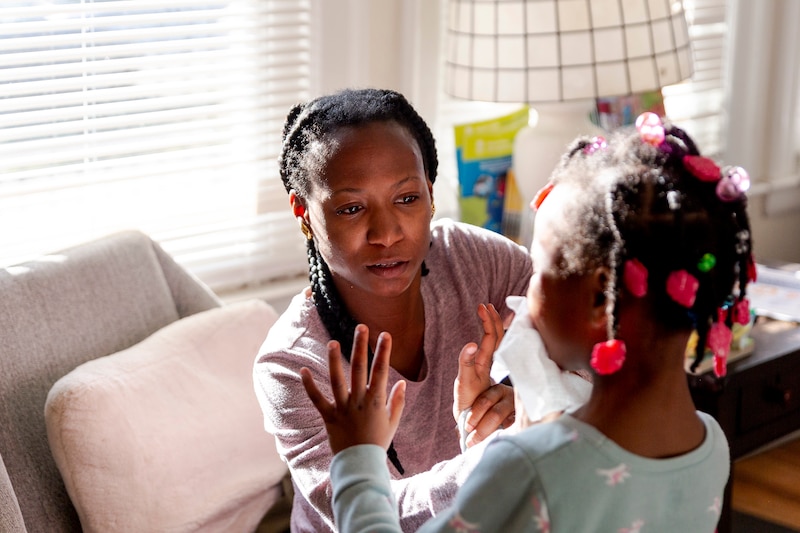
Vance said he believes there are bipartisan solutions on child care. He said current federal programs don’t provide enough flexibility for families to choose options like church-based child care and family co-ops. The U.S. Department of Health and Human Services website and other sources say faith-based and home child care options are eligible for federal funding. Vance had previously suggested grandparents could help out more with child care.
Trump has said that he would fix child care, and that it would be “not very expensive” compared to the trillions the federal government would collect until his tariff proposal. But he has not offered details.
Both campaigns have expressed support for an expanded child tax credit, though they differ on the amount of money families should receive. It’s also unclear if Vance and Trump would support giving the full payment to parents who earn little or no income, as the pandemic-era policy Harris supports reviving would.
Erica Meltzer is Chalkbeat’s national editor based in Colorado. Contact Erica at emeltzer@chalkbeat.org.
Kalyn Belsha is a senior national education reporter based in Chicago. Contact her at kbelsha@chalkbeat.org.

